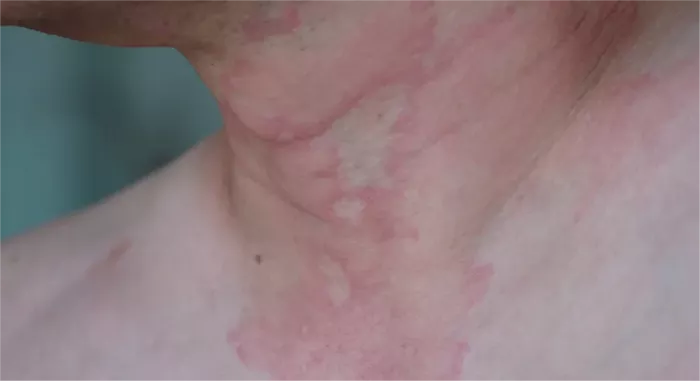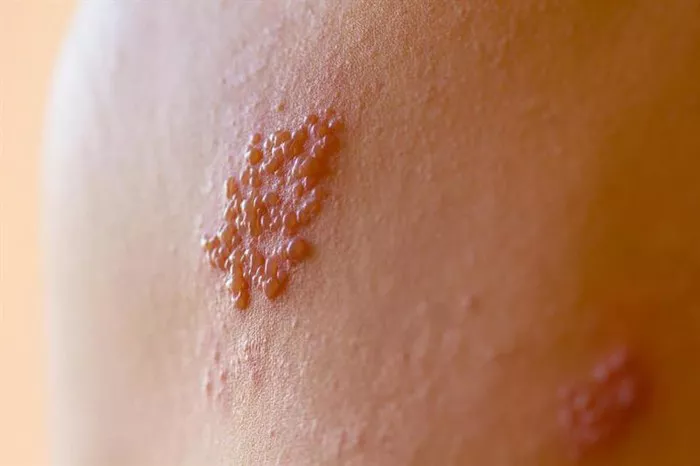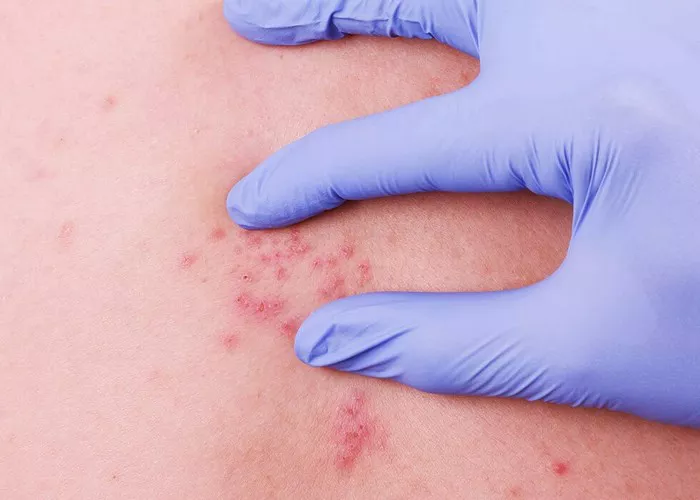Experiencing hives, also known as urticaria, when you have a cold can be perplexing and uncomfortable. This phenomenon is not uncommon, yet it is not widely understood. Hives are typically characterized by red, itchy welts on the skin, which can be triggered by a variety of factors. When these welts appear in conjunction with a cold, it can add an additional layer of distress to an already uncomfortable situation. Understanding why hives occur during a cold involves delving into the immune system, the nature of viral infections, and the body’s complex response to stress and illness.
The Immune System’s Role
The Immune System’s Double-Edged Sword
The immune system is a complex network of cells, tissues, and organs that work together to defend the body against harmful invaders, such as viruses and bacteria. When you catch a cold, your immune system springs into action to combat the virus responsible for the infection. This immune response is essential for overcoming the illness, but it can also lead to unintended side effects, such as hives.
The immune system responds to a cold virus by releasing various chemicals, including histamines, cytokines, and other inflammatory mediators. Histamines, in particular, play a significant role in the development of hives. They increase the permeability of blood vessels, allowing immune cells to reach the site of infection more efficiently. However, this increased permeability can also cause fluid to leak into surrounding tissues, leading to the characteristic swelling and itching of hives.
Histamine Release and Hives
Histamine Release: The Catalyst for Hives
Histamine is a crucial player in the body’s immune response. It is stored in certain cells, such as mast cells and basophils, and is released when these cells are activated by the immune system. During a cold, the release of histamine is a part of the body’s effort to fight off the viral infection. Unfortunately, this same histamine release can also trigger the symptoms of hives.
When histamine is released, it binds to receptors on nearby blood vessels, causing them to dilate and become more permeable. This leads to the leakage of fluid into the skin, resulting in the red, swollen welts associated with hives. Additionally, histamine can directly stimulate nerve endings in the skin, causing the intense itching that often accompanies hives.
Viral Infections and Immune System Activation
Viral Infections: Triggers for Immune System Activation
Cold viruses, such as rhinoviruses and coronaviruses, can directly stimulate the immune system. When these viruses infect the respiratory tract, they trigger a cascade of immune responses aimed at eliminating the infection. This involves the activation of various immune cells, the release of inflammatory mediators, and the production of antibodies.
The activation of the immune system during a viral infection is a double-edged sword. While it is necessary for fighting off the infection, it can also lead to unintended consequences, such as the development of hives. The inflammation caused by the immune response can increase the likelihood of histamine release, thereby triggering hives in susceptible individuals.
Stress and the Body’s Response
Stress and Its Impact on the Immune System
Stress is another factor that can exacerbate the occurrence of hives during a cold. The body’s response to stress involves the release of stress hormones, such as cortisol and adrenaline, which can affect the immune system. Chronic stress can lead to an imbalance in the immune response, making the body more prone to allergic reactions and inflammation.
When you have a cold, the physical stress of the illness, combined with the psychological stress of feeling unwell, can create a perfect storm for the development of hives. Stress can increase the release of histamine and other inflammatory mediators, amplifying the body’s response to the cold virus and increasing the likelihood of hives.
Pre-existing Allergies and Sensitivities
The Role of Pre-existing Allergies and Sensitivities
Individuals with pre-existing allergies or sensitivities are more likely to develop hives when they have a cold. Allergies involve an overactive immune response to otherwise harmless substances, such as pollen, dust mites, or certain foods. When someone with allergies catches a cold, their already sensitized immune system may overreact to the viral infection, leading to an increased release of histamine and the development of hives.
Moreover, people with conditions like allergic rhinitis or asthma often have higher baseline levels of inflammation and histamine in their bodies. When they get a cold, the additional immune activation can push their system over the threshold, resulting in hives.
SEE ALSO: Why Do I Keep Getting Hives Everywhere?
The Connection Between Cold Medications and Hives
Cold Medications: Friend or Foe?
Many people use over-the-counter medications to alleviate the symptoms of a cold, such as decongestants, antihistamines, and pain relievers. While these medications can provide relief, they can also contribute to the development of hives in some individuals. For example, non-steroidal anti-inflammatory drugs (NSAIDs) like ibuprofen and aspirin can trigger hives in susceptible individuals. These medications can increase the release of histamine or other inflammatory mediators, leading to hives.
Conversely, some cold medications, such as antihistamines, are designed to reduce the symptoms of hives by blocking the effects of histamine. However, not all antihistamines are equally effective, and some individuals may need higher doses or different types of antihistamines to control their symptoms.
Autoimmune and Chronic Conditions
Autoimmune and Chronic Conditions: A Complicated Relationship
Certain autoimmune and chronic conditions can also predispose individuals to developing hives during a cold. For example, autoimmune conditions like lupus or thyroid disease can cause chronic inflammation and an overactive immune response. When individuals with these conditions catch a cold, their immune system may overreact, leading to the release of histamine and the development of hives.
Additionally, conditions like chronic urticaria, where individuals experience persistent hives, can be exacerbated by viral infections like the common cold. In these cases, the cold acts as a trigger that worsens the underlying condition, leading to more frequent or severe outbreaks of hives.
Genetic Predisposition
Genetic Factors: Inherited Tendencies
Genetics also play a role in determining who is more likely to develop hives during a cold. Some individuals are genetically predisposed to allergic reactions and may have a higher baseline level of histamine or other inflammatory mediators in their bodies. This genetic predisposition can make them more susceptible to developing hives in response to various triggers, including viral infections like the common cold.
Research has shown that certain genetic variants are associated with an increased risk of allergies and hives. These genetic factors can influence how the immune system responds to infections and other stimuli, making some individuals more prone to developing hives when they have a cold.
Environmental Factors
Environmental Triggers: The Surrounding Influence
Environmental factors can also contribute to the development of hives during a cold. Exposure to allergens, such as dust mites, pet dander, or pollen, can increase the likelihood of hives in individuals with sensitivities. When someone with these sensitivities catches a cold, their immune system is already on high alert, making it more likely that they will develop hives in response to the viral infection.
Additionally, environmental factors like temperature changes, humidity, and air pollution can influence the severity of hives. Cold, dry air can exacerbate skin conditions and increase the likelihood of hives, while humid conditions can promote the growth of mold and other allergens, triggering hives in susceptible individuals.
Diagnosis and Treatment
Diagnosing the Cause: Identifying Triggers and Underlying Conditions
Diagnosing the cause of hives during a cold involves a thorough medical history and physical examination. Healthcare providers will consider various factors, including the timing and duration of hives, any known allergies or sensitivities, and the use of medications. In some cases, additional tests, such as blood tests or skin prick tests, may be necessary to identify specific triggers or underlying conditions.
Treatment for hives during a cold typically involves addressing both the symptoms of the cold and the hives. This may include the use of antihistamines to reduce itching and swelling, as well as other medications to manage cold symptoms. In severe cases, corticosteroids or other immunosuppressive medications may be necessary to control the immune response and alleviate hives.
Preventative Measures
Preventative Strategies: Reducing the Risk
Preventing hives during a cold involves managing both the cold symptoms and the factors that can trigger hives. Here are some strategies that can help reduce the risk:
1. Avoid Known Allergens: If you have known allergies, take steps to minimize exposure to allergens, such as keeping your home clean, using air purifiers, and avoiding contact with pets or other triggers.
2. Manage Stress: Practice stress-reducing techniques, such as deep breathing, meditation, or yoga, to help keep your immune system balanced and reduce the likelihood of hives.
3. Stay Hydrated: Drink plenty of fluids to help thin mucus and keep your skin hydrated, which can reduce the risk of hives.
4. Use Humidifiers: Using a humidifier can help maintain optimal humidity levels in your home, reducing the risk of dry skin and hives.
5. Avoid NSAIDs: If you are prone to hives, consider avoiding NSAIDs and using alternative pain relievers, such as acetaminophen, after consulting with your healthcare provider.
Conclusion
A Complex Interplay: Understanding and Managing Hives During a Cold
The occurrence of hives during a cold is a result of a complex interplay between the immune system, viral infections, and various individual factors such as genetics, stress, and pre-existing conditions. While the immune system’s response to a cold is essential for fighting off the infection, it can also lead to unintended side effects like hives. By understanding the mechanisms behind this phenomenon, individuals can take steps to manage and prevent hives, reducing discomfort and improving overall well-being during a cold.
Through careful management of cold symptoms, avoidance of known triggers, and the use of appropriate medications, individuals can minimize the impact of hives and focus on recovering from the cold. If hives persist or are severe, seeking medical advice is crucial to identify any underlying conditions and receive appropriate treatment. Understanding the connection between hives and the common cold empowers individuals to take proactive measures and improve their quality of life, even during illness.
Related Topics:


























